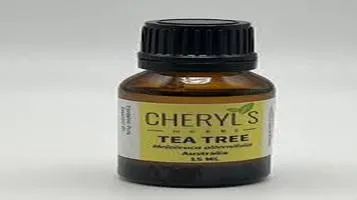Tea Tree Oil: Nature’s Versatile Elixir
Tea Tree Oil, derived from the leaves of the Melaleuca alternifolia plant native to Australia, is renowned for its potent antiseptic and anti-inflammatory properties. This essential oil has a fresh, medicinal aroma and a pale yellow color. Historically used by Indigenous Australians for its healing abilities, Tea Tree Oil is now widely incorporated into skincare and haircare products due to its ability to combat acne, soothe irritated skin, and treat dandruff. Its natural antibacterial and antifungal characteristics make it an effective remedy for minor cuts, insect bites, and fungal infections. However, it should be used with caution, as it can cause irritation if applied undiluted. Always perform a patch test before full application and consult with a healthcare professional for proper usage.

Tea Tree Oil, derived from the leaves of the Melaleuca alternifolia tree native to Australia, has long been celebrated for its myriad of therapeutic benefits. This essential oil, known for its potent antiseptic properties, has increasingly found its way into a variety of personal care and medicinal products, making it a staple in both holistic and conventional medicine. With its distinctive camphoraceous aroma and a range of applications, Tea Tree Oil is truly nature’s versatile elixir.
Historical Context and Modern Relevance
Historically, Tea Tree Oil was used by the indigenous Bundjalung people of eastern Australia to treat cuts, wounds, and infections. They would crush the leaves and apply them directly to the skin, a practice that laid the foundation for modern-day applications. In the 1920s, Australian chemist Arthur Penfold confirmed the antimicrobial properties of Tea Tree Oil, leading to its incorporation into mainstream medical use. Today, this essential oil continues to be a key ingredient in over-the-counter skin care, hair care, and oral hygiene products, as well as a popular choice in aromatherapy.
Antimicrobial Superstar
One of the most well-documented benefits of Tea Tree Oil is its antimicrobial strength. It is effective against a broad spectrum of bacteria, viruses, and fungi, making it a go-to solution for a variety of skin conditions. Acne sufferers, in particular, find solace in Tea Tree Oil’s ability to reduce inflammation and eliminate acne-causing bacteria. A study published in the "Medical Journal of Australia" in 1990 found that a 5% Tea Tree Oil gel was as effective as a 5% benzoyl peroxide lotion in alleviating acne, with fewer side effects like dryness and peeling.
Fungal infections, such as athlete's foot and nail fungus, also respond well to Tea Tree Oil. Its antifungal properties can inhibit the growth of dermatophytes, the fungi responsible for these common ailments. Users typically apply a few drops of the oil to the affected area, sometimes diluting it with a carrier oil like coconut or olive oil to prevent skin irritation.
A Natural First Aid Kit
Tea Tree Oil is not just for chronic conditions; it excels as a natural first aid kit. Its antiseptic qualities make it an excellent choice for treating minor cuts, scrapes, and burns. When applied to a wound, Tea Tree Oil cleanses the area, reduces the risk of infection, and promotes faster healing. Its anti-inflammatory properties also help reduce redness and swelling, making it beneficial for insect bites and stings.
Hair and Scalp Health
The benefits of Tea Tree Oil extend to hair and scalp health as well. It is a popular ingredient in shampoos and conditioners designed to combat dandruff and seborrheic dermatitis. The antifungal and antibacterial properties of the oil help eliminate the underlying causes of dandruff, while its moisturizing qualities soothe an itchy, irritated scalp. Some users also report that Tea Tree Oil can help prevent lice infestations, making it a versatile addition to hair care routines.
Oral Hygiene
Surprisingly, Tea Tree Oil also plays a role in oral health. It is often found in natural toothpaste and mouthwash formulations due to its ability to combat the bacteria responsible for bad breath, plaque, and gum disease. However, it is crucial to note that Tea Tree Oil should never be ingested. Rinsing with a properly diluted solution can help maintain oral hygiene, but care must be taken to avoid swallowing.
Aromatherapy and Mental Well-being
In the realm of aromatherapy, Tea Tree Oil is valued for its invigorating and purifying scent. Many users find that diffusing the oil helps to clear the mind, reduce stress, and improve overall mental clarity. Its revitalizing aroma can also help alleviate symptoms of colds and respiratory issues when inhaled. Some even add a few drops to their bath for a relaxing, spa-like experience.
Cautions and Considerations
While Tea Tree Oil is generally safe for topical use, it is potent and can cause skin irritation in some individuals, particularly if used undiluted. A patch test is recommended before full application. Additionally, Tea Tree Oil should be kept out of reach of children and pets, as ingestion can lead to toxicity. Pregnant and breastfeeding women should consult a healthcare provider before using Tea Tree Oil, as its effects in these populations are not well-studied.
Conclusion
Tea Tree Oil’s extensive range of applications, from skincare and haircare to first aid and aromatherapy, underscores its status as a versatile and invaluable natural remedy. Its powerful antimicrobial properties make it an effective treatment for a variety of ailments, while its soothing and invigorating qualities contribute to overall well-being. As with any natural remedy, it is essential to use Tea Tree Oil responsibly, respecting its potency and potential side effects. When used correctly, this remarkable essential oil can be a powerful addition to anyone’s health and wellness arsenal.






